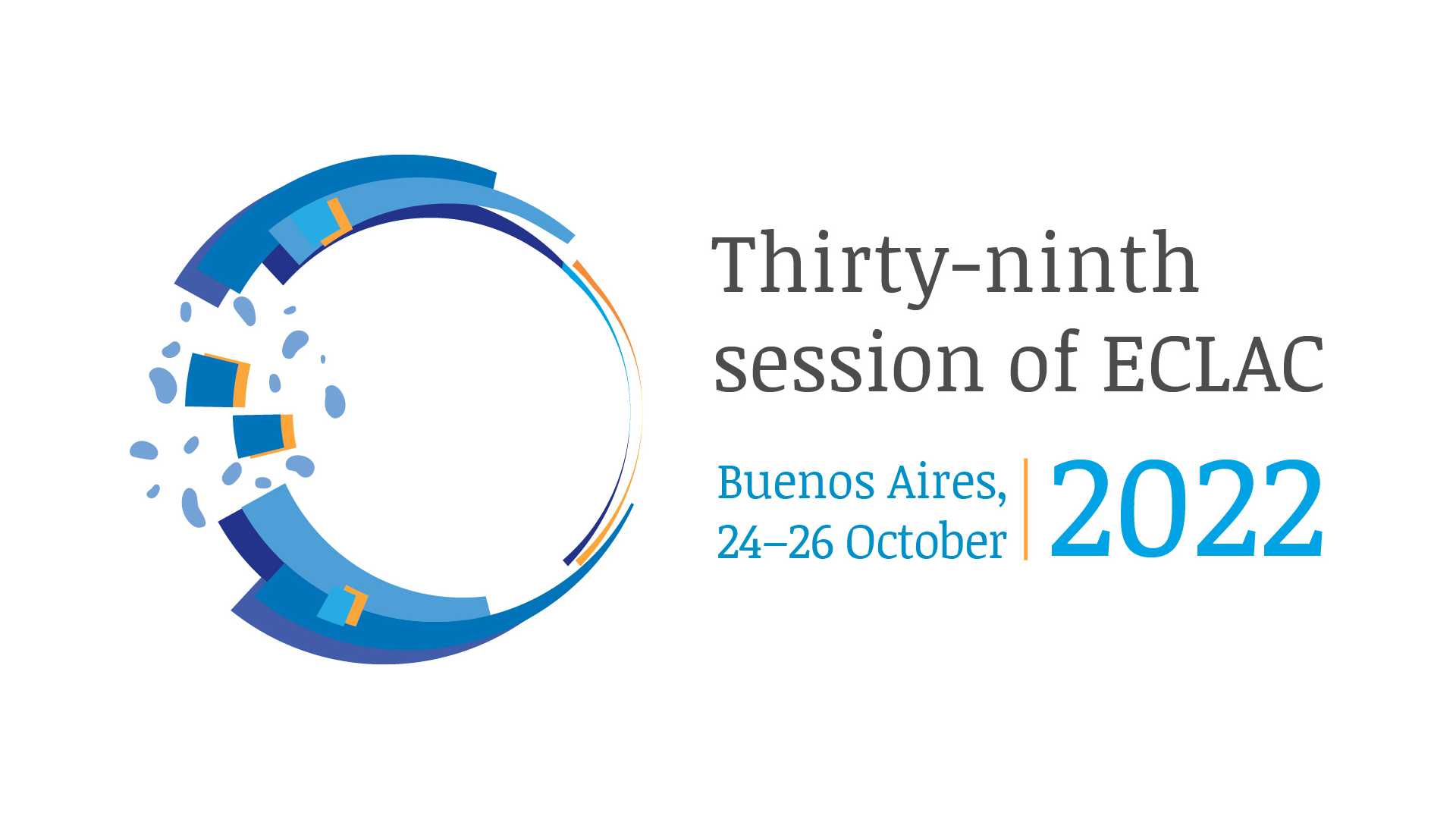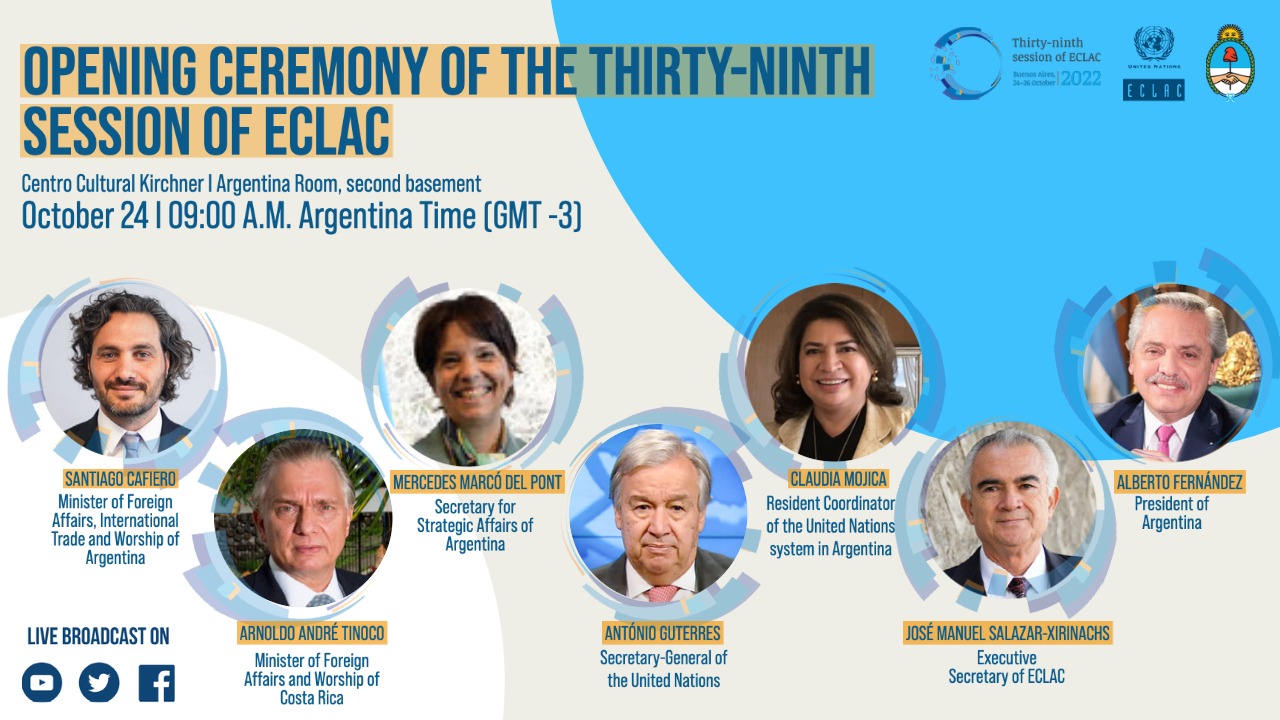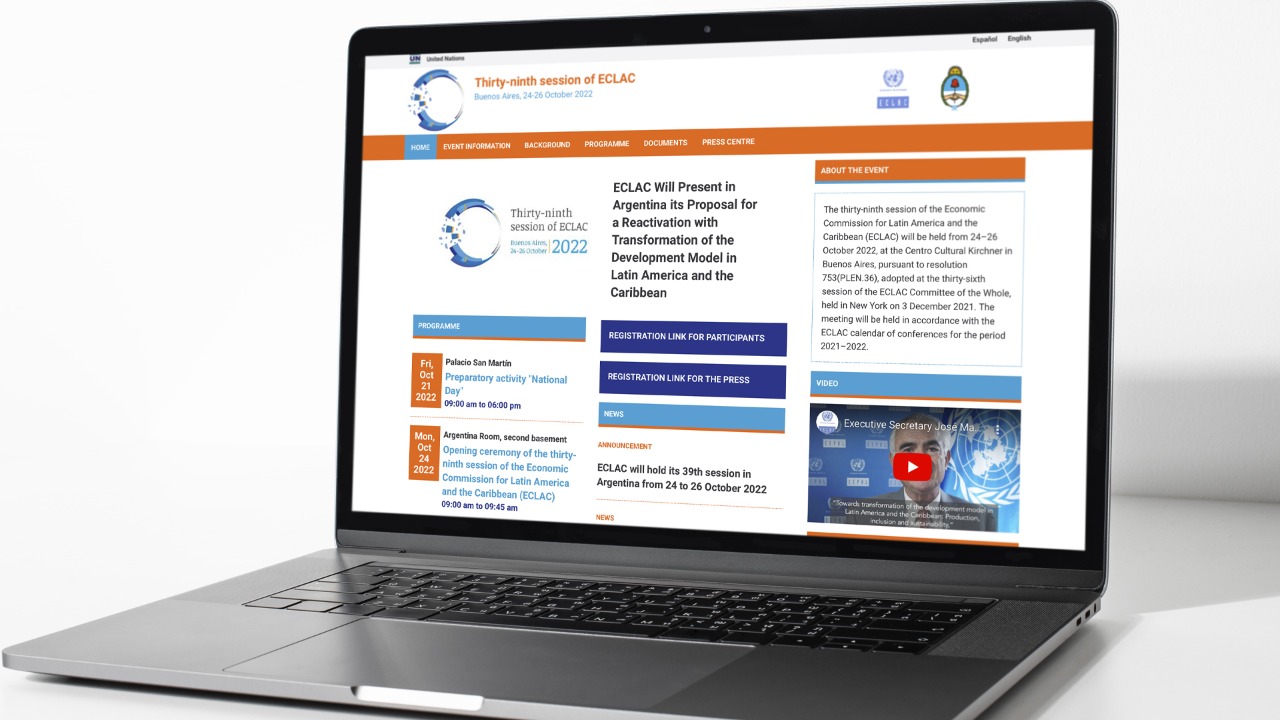Latin America and the Caribbean Must Redouble Efforts to Transform Development Models and Put Policies for Productive Transformation and Diversification at the Center
At its thirty-ninth session, which begins this Monday, October 24 in Buenos Aires, ECLAC will present the region’s countries with its proposal for driving higher, more sustained growth and sustainable and inclusive development.

Latin America and the Caribbean needs ambitious public policies to overcome the deep crisis it has been living through in the last ten years. The region is mired in a development crisis, amid a lost decade; it cannot transform development models by doing the same thing or doing what works on a small scale. This is not a time for gradual or timid changes, but rather for transformative and bold policies that really make a difference on development. That is why ECLAC proposes 10 priority policy areas for transforming the region’s development model, and identifies possible sectors to drive sustainable and inclusive growth.
This is the proposal that the Economic Commission for Latin America and the Caribbean (ECLAC) will present to its 46 Member States and 14 associate members during its thirty-ninth session – the United Nations regional commission’s most important biennial meeting – which will take place on October 24-26 in Buenos Aires, Argentina.
At the event – which will bring together senior authorities from the region, along with researchers, renowned scholars, representatives of civil society and international officials – the Executive Secretary of ECLAC, José Manuel Salazar-Xirinachs, will unveil the institutional document entitled Towards transformation of the development model in Latin America and the Caribbean: production, inclusion and sustainability, in which the organization will provide countries with its proposal for recovery and sustainable development in the new global and regional context.
In five chapters, the report analyzes issues such as the present and future of globalization, the productive heterogeneity specific to the region, and it discusses policies for sustainable productive development. It also addresses the dynamics between employment and social protection and the importance of sectoral drivers for reactivating economic growth. It examines other topics as well, such as the circular economy, the care economy and the digital transformation, and it presents a set of policy recommendations for sustainable development given the new international and regional outlook.
According to the document, in 2022 the region’s countries are facing the effects of a series of cascading crises related to the climate, health, employment, social matters, education, food security, energy and the cost of living – all of which have effects of varying intensity and diverse characteristics on numerous countries, including all of those in Latin America and the Caribbean.
In the region, the combination of external and domestic factors has reduced the capacity for economic growth and quality job creation and has hampered its fight against poverty and extreme poverty. The region’s economic and social structures have weakened and have fallen into situations that reinforce the inertia of a weak economic performance.
In this regard, the publication indicates that after the low rate of 0.6% average annual economic growth recorded in the 2014-2019 period, a historic contraction of 6.9% in 2020 and a recovery of 6.5% in 2021, ECLAC estimates that the economies of Latin America and the Caribbean will grow by 3.2% in 2022 and experience a sharp deceleration in 2023, with growth projected at 1.4%.
In addition, the lower growth in economic activity has recently been accompanied by a significant rise in the inflation rate. In June 2022, the regional average was 8.4%, more than twice the average value seen between January 2005 and December 2019 (of 4.1%). Furthermore, the fiscal situation of the region's countries has deteriorated as a result of the significant fiscal efforts they made to combat the worst moments of the COVID-19 crisis and its social consequences.
In line with all this, the social situation in the region has also deteriorated, with considerable increases in poverty levels reflecting the effects of the pandemic and of the accompanying economic recession. In 2020, ECLAC calculated that poverty and extreme poverty affected 33.0% and 13.1%, respectively, of the population. In 2021, the incipient economic recovery translated into a very modest decline in poverty, to 32.1%, and a small, but continuous, increase in extreme poverty, to 13.8%.
“It is in this context that the region’s countries must adopt policies that would allow them to invigorate sustainable growth, reduce inflationary pressures, create quality jobs, and mitigate the social costs while also reducing poverty and inequality. All of this poses serious challenges for political and governance systems and for public institutions’ technical, operational and policy capacities,” ECLAC’s document indicates.
Throughout its history, the Commission has insisted that macroeconomic policies matter a great deal for the dynamics of structural change and productive development, but that microeconomic and sectoral policies are also key. In other words, both cross-cutting and sectoral policies for productive development are needed.
Along this line of thinking, ECLAC has proposed to the region a series of driving sectors that can energize the productive and structural transformation, as well as investment and job creation. These are: energy (energy transition), electromobility, the circular economy, the bioeconomy, the health-care manufacturing industry, the digital transformation, the care economy, sustainable tourism, and Micro, Small and Medium-sized Enterprises (MSMEs) and the social and solidarity economy.
In its proposals, the United Nations regional organization emphasizes the urgency of taking action to recover investment and growth; recognizes the central role of the State in designing and implementing policies for transforming the development model; and argues for the importance of working to strengthen public and private partnerships.
In order to coordinate such a plethora of problems and policy alternatives, ECLAC stresses the need to make progress on fiscal, productive, social and environmental compacts to surmount the problems of the current juncture and move in the long term towards societies that are sustainable, cohesive and resilient – characteristics that entail advancing towards the realization of welfare states in the framework of a care society.
The document will be commented upon by a high-level panel this Monday, October 24, starting at 9:50 a.m. local time in Argentina (GMT -3) as part of the Commission’s thirty-ninth session. The panel will be moderated by Argentina’s Minister of Foreign Affairs, International Trade and Worship, Santiago Cafiero, and will feature the participation of the Nobel Prize in Economics recipient, Joseph Stiglitz; the Professor in the Economics of Innovation and Public Value of University College London, Mariana Mazzucato; the Minister of Finance and Public Credit of Colombia, José Antonio Ocampo; and the Secretary-General of the United Nations Conference on Trade and Development (UNCTAD), Rebeca Grynspan.
This panel as well as ECLAC’s entire meeting will be transmitted online via various platforms: the website https://live.cepal.org/ and the Commission’s accounts on Twitter (https://twitter.com/cepal_onu) and Facebook (https://www.facebook.com/cepal.onu).
Related event

Thirty-ninth session of ECLAC
The thirty-ninth session of the Economic Commission for Latin America and the Caribbean (ECLAC) will be held from 24–26 October 2022, at the Centro Cultural Kirchner in Buenos Aires, pursuant to…
Related content

Argentina’s President Will Inaugurate the Thirty-Ninth Session of ECLAC
The United Nations regional commission’s most important biennial meeting will take place on October 24-26 in Buenos Aires.

How to Follow the Debates of ECLAC’s Most Important Intergovernmental Conference on October 24-26
The 39th session of ECLAC will be transmitted via all of the institution’s platforms. Those interested can join the conversation using the hashtags #SESeclac2022 and #ReactivationWithTransformation.
Related link(s)
Country(ies)
- Latin America and the Caribbean
Contact
Public Information Unit
- prensa@cepal.org
- (56 2) 2210 2040